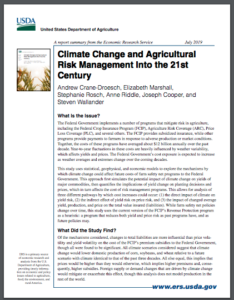Full Title: Climate Change and Agricultural Risk Management Into the 21st Century
Author(s): Andrew Crane-Droesch, Elizabeth Marshall, Stephanie Rosch, Anne Riddle, Joseph Cooper, and Steven Wallander
Publisher(s): United States Department of Agriculture
Publication Date: July 20, 2019
Full Text: Download Resource
Description (excerpt):
The Federal Government implements a number of programs that mitigate risk in agriculture,
including the Federal Crop Insurance Program (FCIP), Agriculture Risk Coverage (ARC), Price
Loss Coverage (PLC), and several others. The FCIP provides subsidized insurance, while other
programs provide payments to farmers in response to adverse production or market conditions.
Together, the costs of these programs have averaged about $12 billion annually over the past
decade. Year-to-year fluctuations in these costs are heavily influenced by weather variability,
which affects yields and prices. The Federal Government’s cost exposure is expected to increase
as weather averages and extremes change over the coming decades.
This study uses statistical, geophysical, and economic models to explore the mechanisms by
which climate change could affect future costs of farm safety net programs to the Federal
Government. This approach first simulates the potential impact of climate change on yields of
major commodities, then quantifies the implications of yield change on planting decisions and
prices, which in turn affects the cost of risk management programs. This allows for analysis of
three different pathways by which cost increases could occur: (1) the direct impact of climate on
yield risk, (2) the indirect effect of yield risk on price risk, and (3) the impact of changed average
yield, production, and price on the total value insured (liabilities). While farm safety net policies
change over time, this study uses the current version of the FCIP’s Revenue Protection program
as a heuristic: a program that reduces both yield and price risk as past programs have, and as
future policies may.
